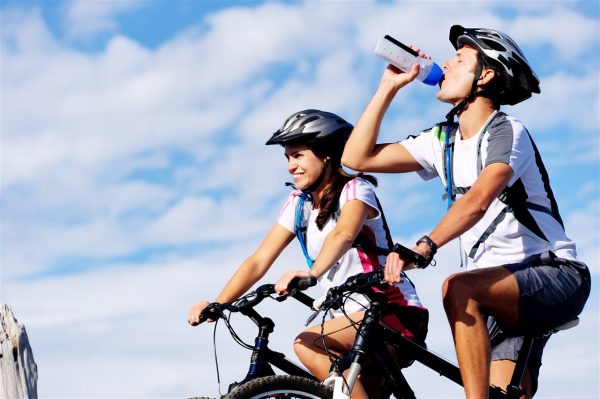 Americans love summertime and with good reason. It is the best time for outdoor fun and travel with family. Many people enjoy outdoor activities such as bicycling, kayaking and hiking, and kids are more active with sports.
Americans love summertime and with good reason. It is the best time for outdoor fun and travel with family. Many people enjoy outdoor activities such as bicycling, kayaking and hiking, and kids are more active with sports.
One thing to keep in mind when out and about in the summer heat is to stay properly hydrated. Unfortunately, many of us are not drinking enough water. In fact, 36 percent of adult Americans drink only three or fewer cups of water per day, according to the Centers for Disease Control and Prevention. Here are some tips for healthy hydration.
Replace your electrolytes
Engaging in physical activity when it is hot outside means you lose water which has to be replaced. You are also losing electrolytes (sodium, potassium, calcium, magnesium and bicarbonate) which need to be replaced. Very high temperatures — especially for a prolonged period — can be dangerous, especially for seniors.
Ideally, anyone engaging in outdoor activity in the heat or even an indoor exercise program should drink 8 to 12 ounces of fluid every 15 to 20 minutes during a session. If exercising exceeds an hour, a beverage that contains electrolytes is preferable to plain water. That is why most sports drinks contain salt. Of course anyone can easily make their own sports drink by adding a quarter to a half teaspoon of salt per liter or 32 ounces of water.
Replacing lost electrolytes is important because they help to regulate cardiovascular and neurological functions, fluid balance and oxygen delivery.
Avoid hyponatremia
Replacing water without sufficient salt can produce hyponatremia, a potentially deadly condition caused by too little sodium in the bloodstream. Symptoms can range from mild to severe and can include nausea, muscle cramps, disorientation, confusion, seizures, coma and even death.
There have been several documented cases of illness and even deaths from hyponatremia over the past several years. According to the British Medical Journal, 16 runners have died as a result of too little sodium and over-hydration, while another 1,600 have become seriously ill. It is true that water intoxication is more commonly seen among extreme athletes, but older individuals may also be at risk for several reasons.
Exercise and aging
It is important to be active but be careful not to push yourself especially in high heat. As we age, our kidneys become less efficient at conserving the salt we need when the body is stressed, such as from dehydration and high temperatures. When combined with common medications such as diuretics, which are commonly prescribed to treat hypertension, the result could be a greater risk for hyponatremia.
When you exercise, your body’s metabolism works at a much higher rate, breaking down and regenerating tissues and creating waste metabolites that need to be flushed out of your system. However, regardless of your level of activity, you still need to maintain good hydration. So remember to always drink plenty of water to beat the heat, but you may also want to up your intake of electrolytes.

